
Localization
RIO DE JANEIRO
Rio de Janeiro city is the second biggest metropolis in Brazil, the fourth in Latin America, the capital of the homonymous state and is situated in the southeast of the country. It is the most known city in the world and depicts Brazil, in what the country exhibits the best. The city is internationally famous for its several tourist attractions such as the beaches of Copacabana, Ipanema, Barra da Tijuca and Leblon, as well as for the Christ Redeemer statue (nowadays one of the Seven Wonders of the Modern World), Sugar Loaf, Maracanã Stadium, the Réveillon at Copacabana beach (one of the biggest and most beautiful on Earth) and Carnival.
Rio de Janeiro was the capital of Portuguese Empire during Napoleon Invasions and then became the capital of Brazil Empire. Later on, Rio de Janeiro became the capital of Republic up to the year of 1960 when Brasilia was inaugurated to replace Rio de Janeiro as federal capital. The city is also known as the Wonderful City and whoever born there is called Carioca.
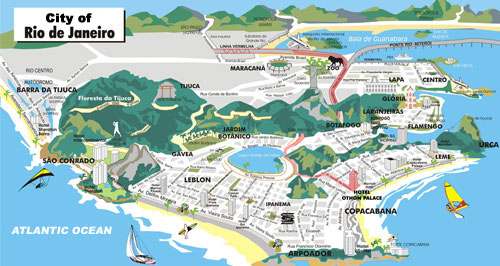
Click on the map to increase it.
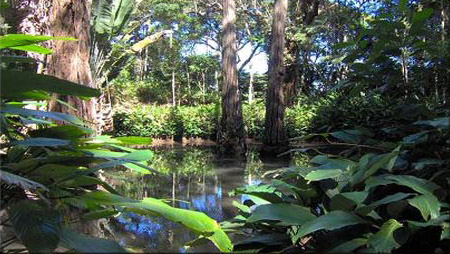 Ecology
Ecology
After you visit the beaches, it is time to become ecologically acquainted with the city. Begin with a walk through the Tijuca Forest, which offers great stopping grounds like the Vista Chinesa. At this location you can see the city and the Taunay fall. A walk through the Botanical Garden provides yet another educational and ecological experience. Parks like the Parque da Cidade and Parque Laje, among others, will complete your very natural experience.
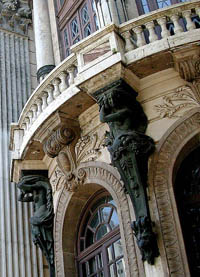
Culture
When you are done exploring the ecological side of town, you can begin discovering the deeply-rooted cultures that have shaped the downtown area. In the Aterro do Flamengo, you can visit the Modem Art Museum, which is located at Aterro do Flamengo. Other attractions include: Paço Imperial, the Municipal Theater, and the Belas Artes Museum. Rio offers its visitors diverse museum experiences, extending this influence by exposing its own history, as monuments from the Empire times are proudly stood. The Candelária Church is an example, since it was built in place of the city’s first church. Other attractions like the São Bento Monastery are also worth visiting.
Sports
If you love sports, you can count on a packed itinerary. Pay a visit to the largest soccer stadium in the world, the Maracanã! The Maracanã offers guided tours even when there are no games! Don’t miss out; take some time to explore the many other sporting attractions this wonderful city has to offer.
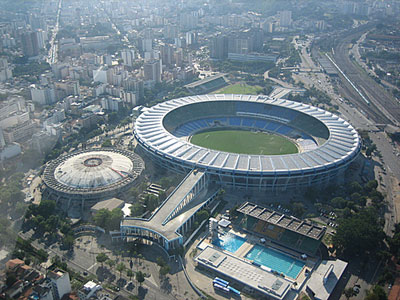
Beaches
If you are craving fun in the sun, a visit to the beach may just be the remedy! Consider trying the world-renowned Copacabana. The Copacabana is famous for its walkway, from which tourists can explore Ipanema, Leblon and other beautiful beaches. Other beaches you can reach from the Copacabana are: São Conrado, Barra da Tijuca and Recreio.
Shopping
If shopping is your hobby, you’re in luck. With large centers like Barrashopping, Rio Sul and Citta America, tourists have numerous stores and services right at their fingertips. For those who wish to take home a small piece of Rio, handcrafting fairs like Babilonia Feira Hype offer unique items for purchase. If you have children, The New York City Center, equipped with cinemas and electronic games, is a great, fun-filled locality.
Planetarium
The institution is known as Fundação Planetário and is under administration of the Secretary of Culture of the Rio de Janeiro Town Hall. It is located at the Gavea neighborhood and close to the Catholic University (PUC).
Rio de Janeiro’s Planetarium is equipped with two domes, one of 263 seats and other of 130 seats. There are also four modern telescopes, all able to aim at about 64 thousand objects. Among the activities carried out along the year, Planetarium offers dome sessions, sky observation, a museum of the universe, a science fair and a kinder land.
The Planetarium complex includes a library, a theatre, conference rooms, a restaurant and a wide green area for children playing.
Come to have some scientific knowledge and a lot of fun!
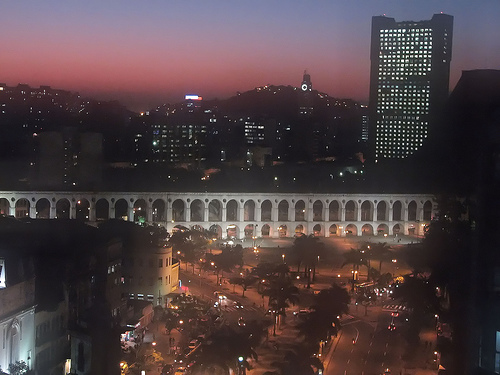 Nightlife
Nightlife
Take advantage of a vibrant and youthful nightlife. In its South Side, the city offers shows, specialty restaurants, bars and discos, and seafront options. These attractions can be found in the neighborhoods of Leblon, Ipanema, Barra da Tijuca and beyond. With such a variety of entertainment venues, something is sure to strike your fancy.
Climate
According to the Köppen classification, Rio de Janeiro has a tropical climate. The average annual temperature is 23, 7ºC and the average yearly precipitation is 1173 mm (neighborhood of Flamengo). The lowest temperature ever registered was 4, 8°C in Campo dos Afonsos, in July, 1928, and the highest 43, 2°C in neighborhood of Bangu, in January, 1984.
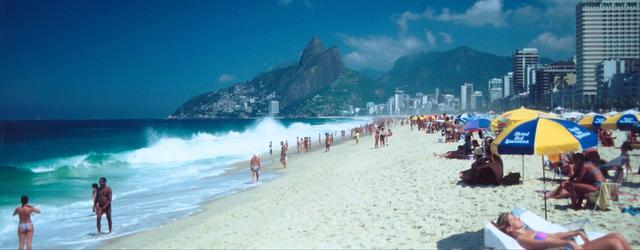
Transport
Airports
The city has three commercial airports:
- Santos-Dumont Airport – satisfactory size - is located in the city's downtown, being mainly used for Rio-São Paulo shuttle service and state and regional flights.
- Galeão International Airport – big airport with two passenger terminals -- is located in Ilha do Governador, a neighborhood in the North Zone of the city.
- Jacarepaguá Airport - the smallest one - is located in the West Zone and is mainly used by private and regional flights in small aircrafts. The only commercial activity in this airport is the aerial taxi.
Besides these airports, there are the military airports: Galeão Air Base, close to the International Airport; Campo dos Afonsos Air Base and Santa Cruz Air Base, which are part of the air defense complex of Brazilian Aeronautics.
Helipad
Rio de Janeiro has a lot of helipads. There is the chance of landing at the airports or at the Helipad of Rodrigo de Freitas Lagoon and other ones.
Harbor
The Harbor of Rio de Janeiro is located in the west coast of Guanabara Bay, near downtown, and serves the states of Rio de Janeiro, São Paulo, Minas Gerais, among others.
Subway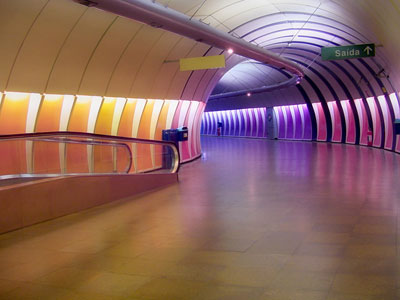
Rio de Janeiro has a subway system that integrates distant neighborhoods. It connects Pavuna, North Zone, to Copacabana, where there is an integrated metro/bus service. The buses go through Ipanema, Leblon, Botafogo, Humaitá, Jardim Botânico, Gávea, São Conrado reaching Barra da Tijuca and beyond. There are also special integration from Pavuna to municipalities in Baixada Fluminense, such as Duque de Caxias, Mesquita, Nilópolis and Nova Iguaçu. In the future, there will be integration metro/bus service to Belford Roxo. It is also possible to get other small integration facilities along the subway system. Recently, a third subway station in Copacabana was opened. In 2008/2009, following the timetable, the station of General Osório, in Ipanema, will be inaugurated. Rio’s subway system has an extension of 42 km distributed in two lines and 38 stations. Rio de Janeiro has the second longest subway railroad system in Brazil, and transports 470 thousand passengers per day.
Bus
This is the most used means of transportation in Rio de Janeiro and there are still about 4 million passengers per day only in the municipal lines. There are around 440 lines and a bus fleet of nearly 10 thousand buses. Alternatively the city has fleets of vans complementing some demanding routes not always covered by conventional buses. [SITE - Portuguese only]
Urban trains
There is an efficient train network in the city once the trains have been modernized by the concessionaire Supervia. The trains are still an useful system of popular transportation. In Rio, they depart from the Estação Ferroviária Central do Brasil to the suburbs, wich comprise also west zone and Baixada Fluminense. The trains go through districts like Méier, Bangu and Madureira, and cities like Nova Iguaçu and Duque de Caxias. There are three main railways, which have ramifications called auxiliary lines. Currently, Supervia is the company that manages urban trains.
Conference Hotel
Acapulco hotel is located in the neighborhood of Leme, close to Copacabana beach, in a very convenient location. The hotel will accommodate speakers and participants according to availability.
Acapulco hotel website: http://www.acapulcohotel.com.br/engl/index.php
Please write to us if you need recommendation about other hotels or hostels.
Curiosities about Rio de Janeiro city
- The city is known as The Wonderful City, a nickname informally given to the city in the middle of the 20th century.
- The city has the most expensive square-meter of the country, at Vieira Souto Avenue in Ipanema.
- According to an article published in American Scientist magazine, Rio is the friendliest city out of 23 cities around the world.
- Many people consider Rio de Janeiro the “image” of Brazil, mainly in what concerns social and cultural aspects. Together with São Paulo, Rio is the city that most culturally influences the country.
- Important companies are headquartered in Rio de Janeiro, such as, Petrobras- the richest and most important company; Globo Organizations - the biggest brazilian communication company; Telemar/Oi,- the biggest telephony company; CVRD (Vale do Rio Doce Company – known and respected worldwide ), among others.
- Bossa Nova made the beauties of Ipanema known all over the world.
- The city has been the candidate to hold the Olympic Games twice and currently it is the candidate to host the games in 2016.
- Rio holds the second biggest population of native Portuguese people, being Lisbon the first one.
- Rio de Janeiro is, par excellence, the city where carnival is most enthusiastically celebrated all over the world.
VISAS
Passport and Visa
Entry visa for foreigners
The visa is federal permission for a foreigner to enter Brazil. For most countries, it is only issued overseas; but for some, a visitor’s entry and permanence in Brazilian territory is authorized for a determined amount of time, defined according to the purpose of the trip.
However, all foreigners who wish to stay longer in Brazil or who were born in countries that do not have an agreement with Brazil’s Ministry of Foreign Affairs should request a visa. It is advisable to consult necessary requirements beforehand, because the process may take a few days to be completed.
The visas are granted to foreigners who come to Brazil for reasons that include diplomatic missions, official trips, tourism, to visit friends and family, business, participation in sport and artistic events, as well as their presence in international seminars and conferences.
The foreign visitor shall fill in the Visa Request Form, available in Portuguese, Spanish, French and English, individually, that is, even if the tourist is taking a minor, said minor shall fill in his/her own form. And if the minor is coming to Brazil without his/her parents or guardian, he/she needs to present an authorization with the signature of both parents.
The request for an entry visa to Brazil can be made at any Brazilian consulate overseas. A fee must be paid, which varies according to the type of visa requested and the amount of time the tourist will remain in the country.
It is important to remember that the passport must be valid for at least six more months, from the date the visa is requested. A recent 3x4 or 5x7 colored photo with white background must also be presented.
When is the visa not required
It is possible to enter and remain in the country for a specific period of time without a visa so long as the visitor’s passport is valid. This permission is derived from diplomatic agreements signed between Brazil and some countries, and it is classified according to the purpose of each trip.
Bearers of Diplomatic passports currently do not need any type of visa or authorization to enter Brazilian national territory if they are from the following countries: Germany, Argentina, Austria, Belgium, Colombia, Denmark, Ecuador, Spain, Great Britain/RU, Greece, Ireland, Israel, Italy, Luxembourg, Norway, the S. M. Order of Malta, Paraguay, Peru, Portugal, San Marino, Senegal, Sweden, Switzerland, Tunisia, Uruguay and the Vatican. But if they are from countries, such as South Africa, Albania, Angola, Armenia, Barbados, Bolivia, Bulgaria, Cape Verde, Cameroon, Chile, South Korea, Ivory Coast, Costa Rica, Croatia, Egypt, El Salvador, Slovakia, Slovenia, Finland, France, Gabon, Guatemala, Guinea Bissau, Honduras, Hungary, India, Iceland, Malaysia, Morocco, Mozambique, Namibia, New Zealand, Netherlands/Holland, Panama, Poland, Dominican Republic, Czech Republic, Romania, Russia, St. Thomas and Prince, Suriname, Thailand, Trinidad and Tobago, Turkey, Ukraine, Venezuela and Vietnam, they have the right to temporary permission for up to 90 days to enter and remain in the country without a visa. If they come from the Philippines or Cuba, they can stay for up to 180 days; and for 30 days, if they are from Guiana or China.
Bearers of Official Passports or Work Passports can enter the country freely if they are from: Germany, Belgium, Denmark, Great Britain/RU, Greece, Ireland, Luxembourg, Norway, the S. M. Order of Malta, Portugal, San Marino, Senegal, Switzerland and the Vatican. And they can remain for up to 90 days without a visa if they are from: South Africa, Albania, Argentina, Armenia, Barbados, Bolivia, Bulgaria, Cape Verde, Cameroon, Chile, Colombia, South Korea, Ivory Coast, Costa Rica, Croatia, Egypt, El Salvador, Ecuador, Slovakia, Slovenia, Spain, Finland, France, Gabon, Guatemala, Guinea Bissau, Honduras, Hungary, India, Iceland, Israel, Italy, Malaysia, Morocco, Mozambique, Namibia, New Zealand, Netherlands/Holland, Panama, Paraguay, Poland, Dominican Republic, Czech Republic, Romania, Russia, St. Thomas and Prince, Sweden, Suriname, Thailand, Trinidad and Tobago, Turkey, Ukraine, Uruguay, Venezuela and Vietnam; for 30 days, if they are from China or Guiana; and for up to 180 days, if they are from Austria, the Philippines, Peru and Tunisia.
Visitors traveling with common Passports, on tourism, can enter and remain in the country for up to 90 days if they are from: South Africa, Germany, Andorra, Argentina, Austria, Bahamas, Barbados, Belgium, Bolivia, Chile, Colombia, South Korea, Costa Rica, Denmark, Ecuador, Slovenia, Spain, Philippines, Finland, France, Great Britain/RU, Greece, Hungary, Ireland, Iceland, Israel, Italy, Liechtenstein, Luxembourg, Malaysia, Morocco, Monaco, Namibia, Norway, New Zealand, The S. M. Order of Malta, Netherlands/Holland, Panama, Paraguay, Peru, Poland, Portugal, San Marino, Sweden, Switzerland, Suriname, Thailand, Trinidad and Tobago, Tunisia, Turkey, Uruguay and the Vatican. However, tourists from: Germany, Angola, Armenia, Bulgaria, Cape Verde, Cameroon, China, Ivory Coast, Croatia, Cuba, Egypt, El Salvador, Slovakia, Gabon, Guatemala, Guiana, Guinea Bissau, Honduras, Hong Kong, India, Mozambique, Dominican Republic, Czech Republic, Romania, Russia, St. Thomas and Prince, Senegal and Vietnam, should invariably apply for the visa in their home country.
Tourists coming from Venezuela can enter and remain in the country for up to 60 days without any need for a visa.
Bearers of common Passports, but who are on business, may enter and remain in Brazil for up to 90 days without a visa, if they are from any of the following countries: South Africa, Germany, Argentina, Austria, Belgium, Chile, Colombia, South Korea, Costa Rica, Denmark, Ecuador, Slovenia, Spain, Philippines, Finland, France, Great Britain/RU, Greece, Hungary, Ireland, Iceland, Israel, Italy, Luxembourg, Morocco, Mexico, Monaco, Norway, New Zealand, The S. M. Order of Malta, Netherlands/Holland, Paraguay, Peru, Poland, Portugal, San Marino, Sweden, Switzerland, Suriname, Thailand, Trinidad and Tobago, Tunisia, Turkey, Uruguay and the Vatican. However, if they are from: Albania, Andorra, Angola, Armenia, Bahamas, Barbados, Bolivia, Bulgaria, Cape Verde, Cameroon, China, Ivory Coast, Croatia, Cuba, Egypt, El Salvador, Slovakia, Gabon, Guatemala, Guiana, Guinea Bissau, Honduras, Hong Kong, India, Liechtenstein, Malaysia, Mozambique, Namibia, Panama, Dominican Republic, Czech Republic, Romania, Russia, St. Thomas and Prince, Senegal, Ukraine, Venezuela and Vietnam, they shall request the visa in their home country prior to departure.
Some countries do not maintain diplomatic relations with Brazil, and therefore, Diplomatic, Official and Work Passports are not accepted, and the visa is only granted to tourist or business visitors, under Brazilian “laissez-passer”. The countries included in this group are: Bhutan, Central African Republic and Taiwan.
The Visa Request form must be filled out for all of the following countries – regardless of the type of passport and the purpose of the trip -, before departure from their home country. They are: Afghanistan, Antigua and Barbuda, Saudi Arabia, Algeria, Australia, Azerbaijan, Bangladesh, Bahrain, Belarus, Belize, Benin, Bosnia, Botswana, Brunei, Burkina Faso, Burundi, Cambodia, Canada, Qatar, Kazakhstan, Chad, Cyprus, Singapore, Comoros, Congo, Democratic Republic of Congo, Cook Islands, North Korea, Djibouti, Dominica, Arab Emirates, Eritrea, United States, Estonia, Ethiopia, Fiji Islands, Gambia, Ghana, Georgia, Granada, Guinea, Equatorial Guinea, Haiti, Yemen, Indonesia, Iran, Iraq, Yugoslavia/Serbia and Montenegro, Jamaica, Japan, Jordan, Kiribati Islands, Kuwait, Laos, Lesotho, Latvia, Lebanon, Liberia, Libya, Lithuania, Macau, Macedonia, Madagascar, Malawi, Maldives Islands, Mali, Malta, Mariana Islands, Marshall Islands, Mauritius Islands, Mauritania, Micronesia, Moldavia, Mongolia, Myanmar/Burma, Nauru, Nepal, Nicaragua, Niger, Nigeria, Oman, Palestine Authority, Papua/New Guinea, Pakistan, Kenya, Kyrgyz, Rwanda, Solomon Islands, Western Samoa, St. Lucia, Saint Christopher-Nevis, Saint Vincent and the Grenadines, Sierra Leon, Seychelles Islands, Syria, Somalia, Sri Lanka, Swaziland, Sudan, Tajikistan, Tanzania, East Timor, Togo, Tonga, Turkmenistan, Tuvalu Islands, Uganda, Uzbekistan, Vanuatu, Zambia, and Zimbabwe.
Should you have any doubts about obtaining a visa to enter Brazil, contact the local or nearest Brazilian consulate. The information written above is subject to change, serving only as a preliminary general orientation to the foreign traveler. When planning a tour or business trip, it is indispensable consulting the Brazilian diplomatic offices in your country. It is worth remembering that all country in the world request visas for those who are going there to work.
Additional Information, please contact for information [email protected]
